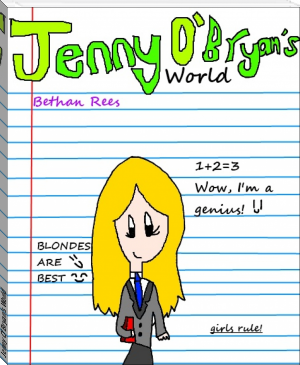The History and Records of the Elephant Club by Doesticks and Underhill (android based ebook reader TXT) 📗

- Author: Doesticks and Underhill
Book online «The History and Records of the Elephant Club by Doesticks and Underhill (android based ebook reader TXT) 📗». Author Doesticks and Underhill
"'How long have you been in this country?'
"The face assumed a look of intelligence, and answer No. 1 came out.
"Edward.—Broome County.
"Clerk.—How old are you?
"Edward.—Two years.
"Clerk.—How long have you been drunk?"
"Edward.—Thirty-four years, seven months, and nine days.
"Clerk.—Where did you get your liquor?
"Edward (rolling his eye toward the Judge).—Been on a spree four days.
"Judge (very indignant).—Did you say I've been on a spree?
"Edward.—Old Mother Bidwell's, down in Mott street.
"Clerk.—Do you mean hereafter to treat this Court respectfully?
"Edward.—No, sir; I hope not.
"Officer with red hair.—If you ain't crazy, I'm a jack-ass.
"Edward.—Yes, sir, of course.[Pg 237]
"The excited Judge here commenced making out his commitment, but the Clerk, who began to see the fun, thought best to ask him a few more questions first, and accordingly inquired of Bobber what he traded in, as he seemed to own a sloop. The prisoner, who had been cogitating upon the last remark of the red-haired officer until he had waxed wroth, burst out:
"'Jack-ass! jack-ass! yes, you are a jack-ass; not a doubt of it.'
"Clerk.—Come, tell me what kind of liquor did you drink yesterday?
"Edward.—Soap, candles, coffee, bar-lead, chickens, coal, pine kindling-wood, smoked hams, and white-wood shingles—
"Judge (interfering).—Prisoner, you are only getting yourself into trouble. My patience will give out. I can't stand everything. Do you think I'm made of patience?
"Edward.—Whisky; nothing but whisky, sir; upon my honor.
"The last answer proved too much for the gravity of the Court. The Judge, the Clerk, the attendant officers, and all smiled audibly. A whispered word from the Clerk explained to the Justice the true state of the case. Edward was discharged, and as he[Pg 238] departed from the court-room, an officer, two blocks away, heard him, in answer to a request for a penny proffered by a little girl, give what was undoubtedly intended as a detailed reply to the last interrogative remark of the Police Justice."
The case of Mr. Palmerston Hook, which was also reported in Wagstaff's notebook, would seem to indicate that there was more than one way of catching fish.
"Mr. Hook was brought up as a vagrant. He was a smooth-faced individual, about old enough to vote, dressed in rather grotesque, flashy clothes, very much worn. The sleeves of his coat were quite large, in accordance with the prevailing style. But they served a purpose of utility, as was developed by the evidence, in a rather novel profession which Mr. Hook followed.
"The principal witness was Mr. James Skinner, a very respectable dealer in Catherine Market, who devotes his time and talents to purchasing eels from the catchers thereof and selling the same to citizens and others who desire to enjoy the luxury of eating eels, either fried or done up in the form of pie or any other form. Mr. Skinner has obtained for himself an enviable popularity as a man of integrity. It has never been said of him that he ever sold an eel[Pg 239] whose recent advent upon dry land from the salt water was a matter of serious question; and to think that Mr. Palmerston Hook should have selected Mr. Skinner's stock to depredate upon is a matter of some surprise. Mr. Skinner testified as follows:
"'This 'ere feller came to my eel-stand yes'day mornin' and asked me how eels was? Sez I, 'Good as usu'l,' and I axed him if he wanted to buy. Sez he, 'How much?' Says I, 'Eight'n pence.' Sez he, 'Is them all yer got?' Sez I, 'Yis.' Ye see, jest before this feller come up, I counted 'em and there was 'zactly 'lev'n. Then this 'ere feller he 'gun to paw 'em over, and kinder jumble 'em up together, which I thowt was wery funny; and at last, sez he, 'Guess I won't take none this mornin'.' He acted so kinder sneakin' that I thowt he wasn't all right, and 'fore he got out of sight I counted the eels an' found one on 'em was missen. I put for this 'ere feller and ketched him at the corner, an' I found my 'spicions was right, for on searchin' the chap I found a neel up in 'is coat-sleeve.'
"Judge.—How did he keep the eel up in his sleeve?
"Mr. Skinner.—Well, that was done in a kinder 'genus way; he had a fish'ook on the end of a line, an' the line was run up the right coat-sleeve, over[Pg 240] 'is shoulder, an' it come down inside of 'is coat on the left side, an' he come up to the stand, an' wen he was a kinder pawin' over the eels he was a ketchin' the fish'ook in the tail of the eel, an' as soon as it was ketched in he pulled the line with his left 'and an' drawed the eel up inter 'is sleeve; an' as soon as it was drawed up he stopped pawin' an' left, an' 'ere's the fish'ook an' line wot I found on 'im; an' I think he oughter be sent to Blackwell's Island for bein' a wagrant.
"Judge.—Hook, what have you got to say for yourself?
"Mr. Hook.—I 'aven't got nothin' to say honly I vos wery 'ungry and vas a lookin' along in the market ven I 'appened to see the heels vot this 'ere hold cock 'ad. Sez I to m'self, sez I, now, I'll hax the price and mebbee the hole voman may vant von if they's cheap. Vell, I 'appened t'ave a 'ook and line in my coat, vich I spose haccidentally got ketched in von of the heels, and ven I left to go and tell the hole voman 'ow cheap they vas, it 'ung on to the 'ook.
"Judge.—That's a pretty story to tell me. Do you suppose I am going to believe it?
"Mr. Hook.—On the honor of a gentleman that vas the vay it 'appened.[Pg 241]
"Judge.—At any rate, I shall send you up for three months.
"Mr. Hook.—Bust me, I honly vish you 'ad to try it three months yourself, you vouldn't think it vas quite so funny.
"Mr. Palmerston Hook was conducted below.
"Another interesting feature of the proceedings during the morning grew out of the case of Mr. Wallabout Warbler, whose name was the last called.
"Mr. Warbler had reached the last stages of shabby gentility. Time had told sadly on his garments, originally of fine material and fashionable cut. His black, curly hair was whitened out by contact with whitewash, and his nose had become a garden for the culture of blossoms by far more common than they are proper. But Mr. Warbler, despite the reverses which he had evidently suffered, stood proudly and gracefully erect. If the external man was in a state of dilapidation, the spirit still was unhurt. He smiled gracefully when the Judge addressed him and told him that he was charged with having been arrested in a state of drunkenness.
"Officers Clinch and Holdem were the witnesses against Mr. Warbler. They stated substantially that about one o'clock that morning they found Mr. Warbler standing in a garbage-barrel, on the edge[Pg 242] of the sidewalk, extemporizing doggerel to an imaginary audience. They insisted upon his stopping, when Mr. Warbler told them that it was a violation of etiquette to interrupt a gentleman when he was delivering a poem before the alumni of a college. He was evidently under the influence of liquor, and quite out of his mind. They thought, for his own safety, that they had better bring him to the station-house.
"Judge.—Mr. Warbler, you have heard what the officers have stated about your eccentric course of conduct; how did you happen to get drunk?
"Mr. Warbler.—'Twas night, and gloomy darkness had her ebon veil unfurled, and nought remained but gas-lamps to light up this 'ere world. The heavens frowned; the twinkling orbs, with silvery light endowed, were all occult on t'other side a thunderin' big black cloud. Pale Luna, too, shed not her beams upon the motley groups which lazily were standing round like new disbanded troops—
"Judge.—It's not to hear such nonsense that I occupy this seat—
"Mr. Warbler.—A death-like stillness e'er prevailed on alley, pier and street.
"Judge.—To listen to such stuff, sir, I can't sacrifice my time[Pg 243]—
"Mr. W.—Don't discombobilate my thought and interrupt my rhyme; I think that when misfortune is put on its defence, poetic justice, logic, law, as well as common sense, demand its story all be heard, unless ex parte proof is to send poor friendless cusses underneath the prison's roof. Shall I proceed?
"Judge.—Proceed; but don't make your tale too long.
"Mr. W.—I'll heed your words, depend upon't. I own that I was wrong in rushing headlong as I did into inebriation, but let me question now the Court; is it not a palliation of the depth of human guilt if malice don't incite to break in divers fragments State laws wrong or right, and when only human appetite, uncontrolled by human reason leads men of genius, oftentime, the dish of life to season with condiments which pro tem. the mental palate tickle, yet very often, in the end, put human joys in pickle which ain't so cussed funny; though all of the expense of grub and the et ceteras the public pays for; hence, I ask this Court (believing that its feelings are not hampered) if justice should not ever be with human mercy tempered?
"Judge.—Perhaps. Now, tell me, Warbler, where you bought your liquor.
"Mr. W.—Anon I'll tell you. Last week, Judge,[Pg 244] prostrate was I, far sicker than to me's agreeable, with the diarrhea chronic, and sympathizing friends advised that I should take some tonic. I asked them what: at once they said, 'Get some lager-bier.' 'Twas got. 'Drink freely, boy,' said they, 'nothing need you fear, but you'll be up and on your legs.' The lager-bier 'was took;' soon every object in my sight had a very drunken look. Lager-bier (to German ears the words may be euphonic.) Tonic, certainly, it was, but decidedly too—tonic. Abnormal thirst excited it, and I went to great excesses (the statement's quite superfluous, my nose the fact confesses). Last night, attracted by the scenes which Gotham's streets present, I dressed myself in sombre clothes, and out of doors I went; to quench my thirst did I imbibe the more of lager-bier at Hoffman's on the corner, several squares from here. No more know I, 'cept in the morn I wakened from my sleep, and having sowed, perhaps I'll learn that likewise I must reap.
"Judge.—Have you got ten dollars?
"Mr. W.—'Tis true, I hain't a red; I suppose the words unpleasant which next to me'll be said; that because by my imprudence my pocket-book's collapsed, in prison drear must I remain till ten days have elapsed.[Pg 245]
"Judge.—I'll let you go this time.
"Mr. Warbler.—Ha, say you so? Is't true, that though my offence is rank, in vain I did not sue for mercy; ne'er 'll I fail to say both through thin and thick in the circle of my acquaintance that you're a perfect brick.
"Mr. Wallabout Warbler left the room."
Mr. Van Dam announced that he had visited the Jefferson Market Police Court one morning, and though there was much in the proceedings that was uninteresting, he had yet been able to collate some facts which he doubted not would be regarded as worthy of being recorded upon the minutes of the club.
After taking a punch, Mr. Van Dam proceeded.
He stated that a dozen or two individuals, all of whom, not having the fear of the law before their eyes, and being instigated by a morbid thirst, and who did in the city and county of New York drink, swill, imbibe, smile, guzzle, suck, and pour down various spirituous, fermented, or malt liquors, wine, beer, ale or cider, and from the effects thereof did get drunk, were severally favored with moral lectures and ten dollar fines. The first were not appreciated, and the second were not paid.
But the case which interested Mr. Van Dam[Pg 246] most was that of four boys, named Frederick T. White, Michael Keefe, John Wheeler, and Manning Hough, who were arraigned on a charge of disorderly conduct. They were bright-looking boys of about thirteen years of age, dressed in plain but neat clothes, and with the exception of White, did not seem much to like the position they occupied. There was a devil-may-care, though not a vicious look, about White, which was positively refreshing. He seemed to rather like the position than otherwise, and from a roguish leer that was observed in his eye as he surveyed a personage who was to appear as the witness against him, Mr. Van Dam was led to anticipate something in the shape of novelty, and he accordingly prepared for





Comments (0)